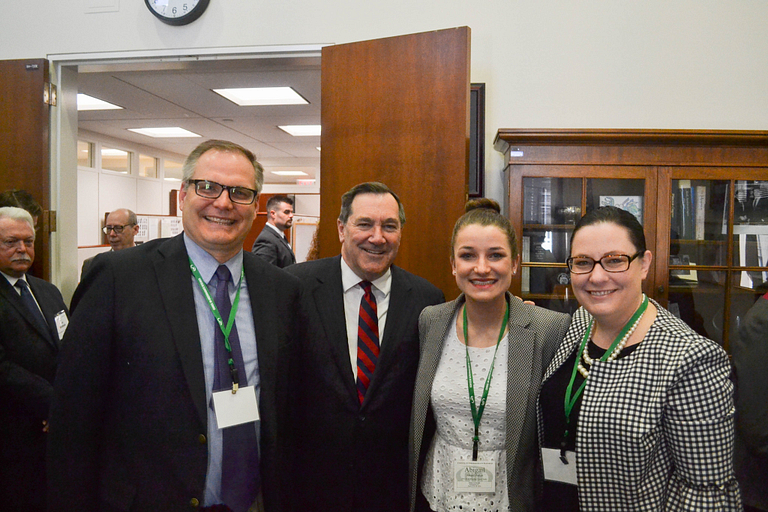
To be a surgeon was always on Abigail Parker’s list of goals. She also knew conducting research was key to making that happen. With commencement and a future at the IU School of Medicine around the corner, the biology and Spanish double-major spoke with us about how researching potential Down syndrome treatments impacted her time at IUPUI and her future.
Q: You recently presented your study at Posters on the Hill, a summit for undergraduate researchers in Washington, D.C., that also allowed you to meet with government officials. What was that experience like?
Abigail Parker: We met with different Indiana representatives and their staffers, advocating, first and foremost, for National Institutes of Health funding. Down syndrome has been historically one of the least well-funded disorders in America even though it’s fairly common. My work is directly the result of an NIH grant. It really seems like we’ve found something very promising, so we just want to continue with that. My ultimate goal as a researcher is for individuals with Down syndrome to have the best life they possibly can. I think research is a huge part of bettering the future of the population in general. If the money’s not there, the research can’t happen.
We also advocated for undergraduate research. It’s been hugely beneficial in my undergraduate career, helping me with science, with critical thinking, with problem-solving, with time management. Every good thing you want to develop in college – working in the lab has helped do that.
Down syndrome research on the Hill
Q: Why Down syndrome research?
AP: I started working in a research lab as a freshman worker. I got randomly placed in Randall Roper’s lab and spent the first year washing dishes and stuffing pipette tip boxes, like a freshman worker does. And then I just kind of fell in love with it.
I feel like it was something that was so relatable. You can see the science, but then you are also able to have the humanity side of it. Dr. Roper is great about getting us into the community. Every year we do the Buddy Walk, which raises money and awareness for Down syndrome. He has contacts at the Down syndrome clinic at Riley Hospital, so I went and shadowed there. He presented at Metazoa Brewing Company, which was open to the public, so we got to meet lots of families with children who have Down syndrome. There are just constant opportunities like that. I love being able to say, “This is what the Down syndrome community looks like. This is who they are. This is the incredible life perspective and values that they bring” on top of also understanding the science of what’s happening.
Q: Why did you choose to come to IUPUI?
AP: I actually was convinced I wanted to go out of state. I split my childhood between Noblesville and Muncie, so I wanted to go somewhere else. Then I visited IU Bloomington and IUPUI. I really liked both of them, but I just loved the city atmosphere that IUPUI has. I love that it’s integrated into downtown with the hospitals and the different businesses.
I also got to tour the Honors College and really felt like it was a great community. They have such a nice space. I could see myself hanging out there, studying there. I actually got a full-ride scholarship here. I got the Bepko Scholars and Fellows scholarship. I couldn’t walk away from that. My parents have always kind of struggled financially, so money for college was just not something we had as a family. The scholarship was really huge, allowing me to be able to come here and graduate next week completely debt-free.
I’m so thankful for all the opportunities I’ve had at IUPUI. I never would have thought, had you told me four years ago, that I would be able to go to D.C. to present research that I have done myself. The professors are so dedicated to what they do. As a student, now exiting IUPUI, I really appreciate that. That really needs to be recognized and appreciated as much as possible.

